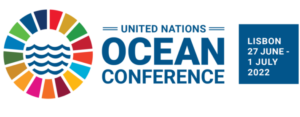Addressing water quality, models of good governance, and the climate crisis to enhance the resilience of coastal communities
Ocean Sewage Alliance, Regions4 Sustainable Development, Fair Oceans
Monday 27 June 2022, 16:00 bis 17:15 UTC+1
Altice Arena – side event room 1
Climate Change and nutrient pollution are the two largest threats to the long-term viability and resilience of the health of our oceans. Addressing these issues at scale requires strong partnerships and good governance structures that will implement the best practices and technologies available in a manner that ensures those practices are maintained and enhanced over time.
This side event will convene a diverse set of practitioners that have been building cross-sector relationships to implement practices and policies that have begun to show that coastal systems do respond to these interventions that will achieve goals set forth in SDG 14, 2030 goals, and more.
Examples of this work will show that addressing these challenges has the potential to not only increase the health of coastal and marine ecosystems bit that the co-benefits of doing so will create local jobs, increase public health, therefore making cities and coastal communities more resilient.
Building a Diverse Alliance to Address Wastewater Pollution to Protect Public and Environmental Health to Increase the Resiliency of Coastal Communities and Economies – Ocean Sewage Alliance –
Stewart Sarkozy-Banoczy, Global Director, Policy and Investments, Resilient Cities Network and Precovery Labs
Jenny Myton, Conservation Program Director, The Coral Reef Alliance
Hon. Spurgeon Miller, Mayor of Guanaja, Honduras
Nancy Soi, Regional Seas Coordinator from UNEP HQ
A recent study conservatively estimates that 80% of the world’s sewage enters either untreated or partially treated into the oceans, coasts and rivers causing deleterious events such as dead zones, fish kills, harmful algal blooms, coral disease, and seagrass losses worldwide. Furthermore scientists from across multiple disciplines have been able to directly link the rate of the loss of these systems directly to wastewater pollution. In order to truly get to scale and to fully protect and enhance the health, resiliency, and productivity of our oceans and the communities and economies that rely on them it is imperative that we focus our efforts on abating this threat through diverse and trusted partnerships across the many sectors involved. Through storytelling of case studies the proposed side event will highlight several OSA partners journeys from foundational science to document the source of the problem, the partnership building and awareness raising to gain support to address the problem and finally goal setting and technological development and implementation to solve the problem. With regards to addressing wastewater at scale policy and rule making, financing mechanisms, and establishing long term accountability measures are key. Interactive portions will expand the conversation around policies, solutions, funding streams and sectors that must be involved to be successful in improving ocean health and the cascading benefits that arise.
Co-management – a governance model to reconcile human uses and biodiversity protection in the ocean – Regions4 Sustainable Development –
Partner: Mr. Rodrigo Levkovicz, Executive Director of the Forest Foundation representing the government of Sao Paolo/SIMA
Finding solutions to the complex and multi-dimensional sustainability challenges faced by coastal areas, which are aggravated by climate change, requires an inclusive and innovative governance approach. This part of the side event will showcase how innovative governance models will be key to achieving the sustainable management of the ocean. It is crucial to ensure the participation of all cities and territories beyond those located in coastal areas to ensure the sustainable management of the ocean. The participation of all involved stakeholders: resource users, scientists, civil society and governments from different levels is crucial for achieving a sustainable use and management of the Ocean. Innovative multi-level and multi-stakeholder governance harnesses the cross-scale and cross-discipline relationships necessary for inclusive governance and decision-making that builds resilience and whereby all involved stakeholders align their efforts in order to achieve maximum effectiveness. Inclusive governance schemes facilitate co-designing and co-implementing an integrated maritime policy based on sound science.
- Mr. Rodrigo Levkovicz, Executive Director of the Forest Foundation representing the government of Sao Paolo/SIMA, Plano Estratégico de Monitoramento e Avaliação do Lixo no Mar (PEMALM)
Contact email: climate@regions4.org
Coastal Communities in the Climate Crisis – Fair Oceans –
Partner: Kai Kaschinski, Chairman Fair Oceans
Dr. Bettina Hoffmann, Parliamentary State Secretary Federal Ministry for the Environment, Nature Conservation, Nuclear Safety and Consumer Protection
Dawda Saine, General Secretary African Confederation of Professional Organizations of Artisanal Fisheries
Bedi Racule, Pacific Conference of Churches
Coastal communities around the world are facing similar negative consequences of climate change along the coastlines of our oceans. In particular, communities in the Global South rely on intact marine nature and coastal ecosystems and often lack sufficient economic capacity for climate mitigation and adaptation. To change this, ocean and climate policy must work with affected communities to discuss their needs in a participatory and transparent manner. These discussions should include issues of coherence between nature-based and rights-based solutions, as well as the dimensions of loss and damage. Against this background it could make sense to initiate a debate on the establishment of a global platform for „coastal communities against the climate crisis“ to share examples of best practices and develop proactive maritime climate policies for the people who need them most.
- Kai Kaschinski, Chairman Fair Oceans, Introduction
- Bettina Hoffmann, Parliamentary State Secretary Federal Ministry for the Environment, Nature Conservation, Nuclear Safety and Consumer Protection, Opening statement and the political arena between climate und ocean policy
- Hans-Otto Pörtner, Co-Chair Intergovernmental Panel on Climate Change, Marine climate change and effects on coastal regions
- Dawda Saine, General Secretary African Confederation of Professional Organizations of Artisanal Fisheries, Marine climate change, small-scale fisheries and the African coastal communities
- Bedi Racule, Pacific Conference of Churches, Marine climate change, sea-level rise and the Pacific island coastal communities
Contact email: fair-oceans@gmx.info





